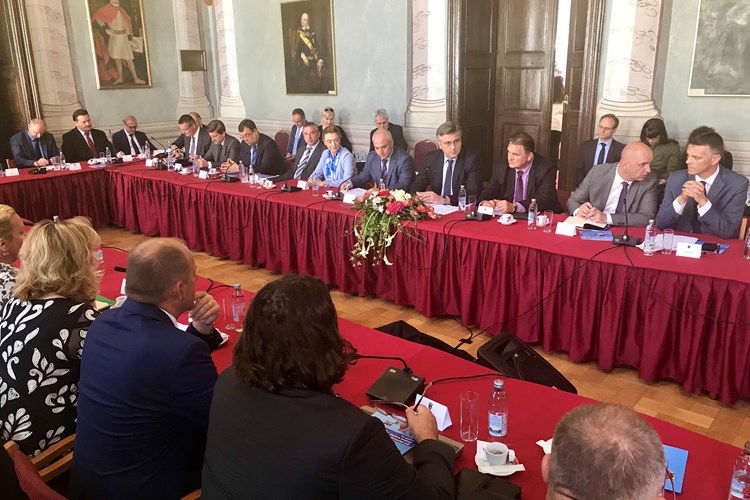- Published: 04.07.2018.
PM: Central and local government have good cooperation in concrete projects
Prime Minister Andrej Plenkovic said in the northwestern city of Varazdin on Wednesday that the fourth meeting between his cabinet and representatives of local and regional government units shows that very concrete cooperation in projects has been achieved which is reflected in numerous legislative proposals, the process of decentralisation of the country, fiscal decentralisation and the better and speedier absorption of EU funds.
"This format of dialogue between the government and local government units is an exceptionally good and useful format that has contributed considerably to the dynamics and substance of cooperation between the government and all areas of Croatia," the prime minister said in his opening remarks at the fourth meeting of his cabinet and county prefects, representatives of the Association of Cities, the Association of Municipalities and the chairman of the parliamentary Committee on Local and Regional Government.
The first meeting was held in Zagreb in December 2016, followed by those in Pozega a year ago and in Sibenik in December last year. The next meeting will be held in Rijeka in December.
The meeting, Plenkovic underscored, absolutely fits in with the government policy and decision "to work together on the country's balanced regional development."
The meeting discussed proposed amendments to the State Administration Act, proposals to improve the financing system of county road authorities, new instruments and mechanisms to strengthen regional and territorial cooperation, better absorption of EU funds and other sources of financing, and the multiannual financial framework 2021-2028.
Plenkovic said it was worthwhile noting that 46% has been absorbed of the total agreed funds from the current financial envelope compared to nine percent when his government came into office.
Pauk: Gov't sees a partner in local government
The president of the Croatian Association of Counties, Sibenik-Knin County Prefect Goran Pauk, commended Plenkovic as the first prime minister who "has decided to actively stimulate the development role of local government, actively and truly taking account that we are the closest to citizens and the needs of local communities. I am certain that we will continue at an even stronger rate," he said in his introductory address.
Pauk added that there has been a positive net effect of HRK 1.4 billion as a result of the new law on financing local government, which, he recalled, is a share of what was previously taken away with the preceding law.
"That move marks the beginning of fiscal decentralisation which is something we advocate and consider to be a precondition for any stronger economic boost to our counties," said Pauk.
Fiscal decentralisation, he underlined, has to be followed by functional decentralisation and he is pleased that legislative solutions have been initiated and achieved for local government to be faster and more efficient in providing services to citizens.
Counties often faced with problems that aren't politically coloured, Varazdin prefect says
Varazdin County Prefect Radimir Cacic, as the host of the meeting, said that the composition of the meeting and topics to be discussed "can avoid the traps of politicking and demagogy," and added that the main problems facing counties aren't politically coloured.
Varazdin Mayor Ivan Cehok stressed that the city has been proclaimed by the European Commission's Doing Business report as the most favourable for business and where it was easiest to do business.
He suggested that the government invite the mayors of larger cities and of those cities where counties have their headquarters as well as representatives of the Association of Municipalities to future meetings.
"That is the form of dialogue that we need because without the participation of municipalities and local government units, particularly those cities in which counties are seated, it will be hard to achieve optimum results in the economy as well as with regard to demographic, social and other measures that are being discussed frequently. When it comes to kindergartens, elderly people's homes, schools, employment offices...mayors certainly know more and are more familiar with the situation in their area than can be seen from Zagreb or some other centre," Cehok said, citing another problem - the lack of the labour force in Varazdin where the unemployment rate is 2.1%.
Cehok appealed for an urgent meeting on connecting the education system with the needs on the labour market "because there will be no labour for new investments." He considers that the state should be included in implementing the project for the Varazdin IT campus given that each year in Croatia there is a shortage of about 400 IT experts.
Text: Hina
